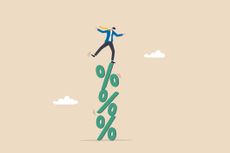Spotify Subscription Price Hike Is Here
The streaming giant says the price changes are to "help us continue to deliver value to fans and artists."


Spotify announced Monday it is raising the price of its premium subscriptions, with prices going up across categories.
"The market landscape has continued to evolve since we launched," the company said in a statement. "So that we can keep innovating, we are changing our Premium prices across a number of markets around the world. These updates will help us continue to deliver value to fans and artists on our platform."
This subscription hike impacts the United States, as well as other countries across the world. If your account is being impacted, Spotify said you will receive an email about the price change.

Sign up for Kiplinger’s Free E-Newsletters
Profit and prosper with the best of expert advice on investing, taxes, retirement, personal finance and more - straight to your e-mail.
Profit and prosper with the best of expert advice - straight to your e-mail.
Starting Monday, the price for a Premium Single, or individual, Spotify account is $10.99 monthly, up from $9.99. Monthly subscription costs are now $14.99 for Premium Duo memberships, $16.99 for Premium Family, and $5.99 for Premium Student. It's a $1 increase across the board, with the exception of the Duo membership, which went up by $2.
A Spotify subscription cost increase was expected after comments CEO Daniel Ek made during the company's first-quarter earnings call in April, Kiplinger previously reported. This announcement comes the day before Spotify will report its second quarter earnings. The stock price fell Monday morning in the wake of the subscription news.
Watch your monthly membership costs
Keeping track of monthly subscription costs is a smart way to maintain savings and monitor your spending habits. Many streaming services have changed prices recently or tweaked how memberships are kept, such as Netflix instituting password-sharing fees.
Spotify said on its support page that existing Premium plan subscribers will get "a one-month grace period before the new price becomes effective unless they cancel before the grace period ends." Those on a trial offer will have one month on the original price after the trial ends.
The company adds that if a user doesn't want to pay the new price, there is a free, ad-supported version people can access, and memberships can be canceled at any time.
If you're looking at music streaming alternatives to see if prices are better, it's largely comparable.
Apple Music has a free three-month trial, followed by monthly payments of $10.99. Amazon Music Unlimited has a 30-day free trial, followed by monthly payments of $8.99 for new subscribers, but only if you're a Prime member. Non-members will pay $10.99 per month. Tidal's HiFi membership has a 30-day free trial, followed by a $9.99 per month cost.
Related Content

Alexandra Svokos is the senior digital editor of Kiplinger. She holds an MBA from NYU Stern in finance and management and a BA in economics and creative writing from Columbia University. Alexandra has a decade of experience in journalism, specializing in online newsrooms. She previously served as the senior editor of digital for ABC News, where she directed daily news coverage across topics through major events of the early 2020s for the network's website. Before that, she pioneered politics and election coverage for Elite Daily and went on to serve as the senior news editor for that group.
Alexandra was recognized with an "Up & Comer" award at the 2018 Folio: Top Women in Media awards, and she was asked twice by the Nieman Journalism Lab to contribute to their annual journalism predictions feature. She has also been asked to speak on panels and give presentations on the future of media, including by the Center for Communication and Twipe.
-
-
 The Era of Super-Low Interest Rates Could Be Over: The Kiplinger Letter
The Era of Super-Low Interest Rates Could Be Over: The Kiplinger LetterThe Kiplinger Letter We’re likely never going back to the historically low rates that prevailed in late 2019 and early 2020.
By David Payne Published
-
 The Simple Yet Devastatingly Effective Secret To Warren Buffett and Oprah's Success
The Simple Yet Devastatingly Effective Secret To Warren Buffett and Oprah's SuccessA look at the common lesson to learn from the success of Warren Buffett and Oprah Winfrey.
By Eric McLoyd Published

